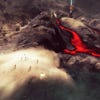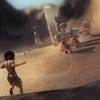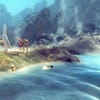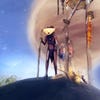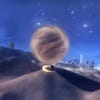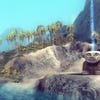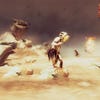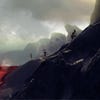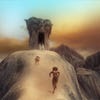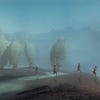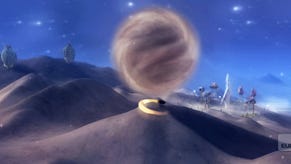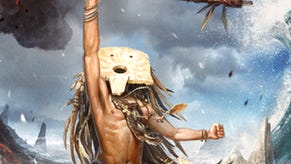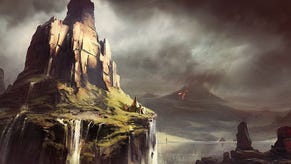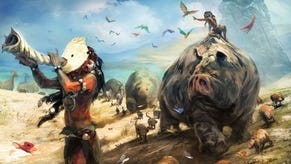From Dust
Earth to earth.
The time-limited powers escalate from a boost to the amount of matter you can move, through the ability to quench fire and evaporate water to the truly godly gifts of the production and elimination of matter. You get the standout power early on: Jellify Water immobilises the fluid and lets you shape it, allowing you to stage your own Moses moment and part the waves.
Other forces of nature come into play. Water springs can be dug out or buried; 'trees' that spread fire or release water can be replanted to combat each other; animals and vegetation establish simple ecosystems. I shan't go into too much detail about how these various devices are employed by the designers, but suffice to say that ideas are seldom repeated across the thirteen stages, and your enemy in one stage is quite often your friend in the next. The importance of balance in nature is a well-rehearsed hippy mantra, but it's seldom been more elegantly expressed in games.
Completed chapters remain open as you left them, and you can revisit them simply to muck around or to achieve the secondary goal of spreading vegetation across as much of the stage as possible. This (like finding certain stones) unlocks hints and the bite-sized Challenge maps.
In contrast to the long-form strategic thrust of most god games, From Dust's goals are immediate and tangible: cross the river, save the village, tame the volcano. The requirements made of you are light - just activating all the totems and getting five men to the portal will complete the map. (Since the Breath is no middle-manager, it doesn't need milestones.)
It's a brilliant move, discouraging methodical play and encouraging experimentation and improvisation. The game starts languidly, but although there are never any time limits as such, the restless forces of nature pile on the pressure in later levels. This gives rise to some awe-inspiring challenges, but occasionally reduces you to frantic to-ing and fro-ing as you try to displace as much matter as possible before the next disaster strikes - more desperate fire-fighter than mighty creator.
This pressured, repetitive style of play doesn't flatter From Dust; it may be far more pacey and tactile than any other god game, but it's still hardly arcade action. It's also the reason many of the time-trial Challenge maps don't really work, although there are a few delightful little puzzles concealed here. Time and population targets for the campaign maps might have been a better way to satisfy Microsoft's contractual (and here ill-fitting) requirement for Xbox Live leaderboards.
There's also a cruel map at the end of the game - a great idea, viciously implemented - that puts a dent of irritation in an otherwise well-sculpted campaign. It can be rushed through in half a dozen hours, will sustain you for twice that, but the game's modest length and size don't reflect its elemental, existential scale. From Dust is a crescendo - of ideas, but mostly of the glorious and fearful drama of nature - that will leave you feeling both humbled and thrilled.
But it still feels like a beginning, and not just because it tells the tale of one. It's a big idea in a small package, and it's begging to be expanded, as Ubisoft has hinted it might be. Pray that it is.
From Dust releases 27th July on XBLA and will be available to download for PC on 17th August. A PSN release will follow.

